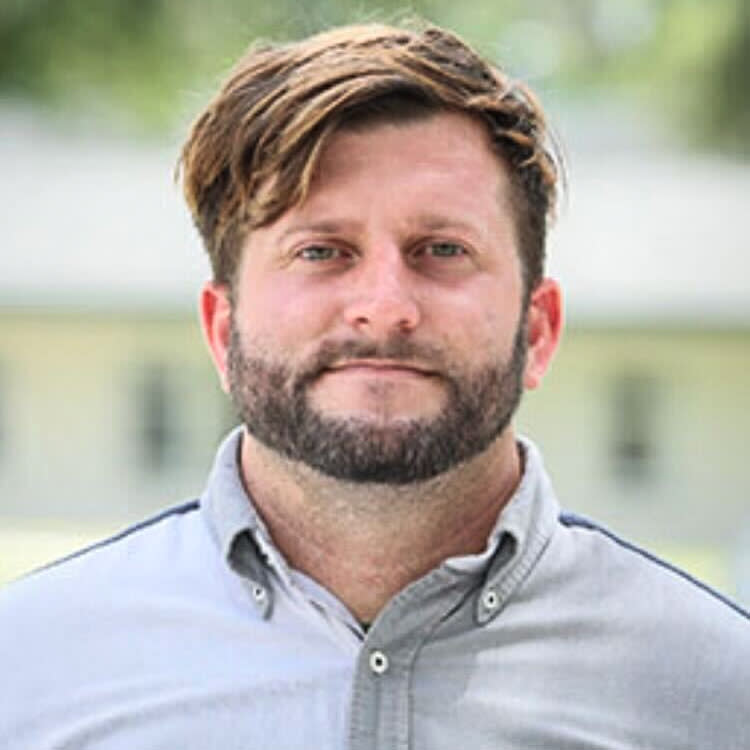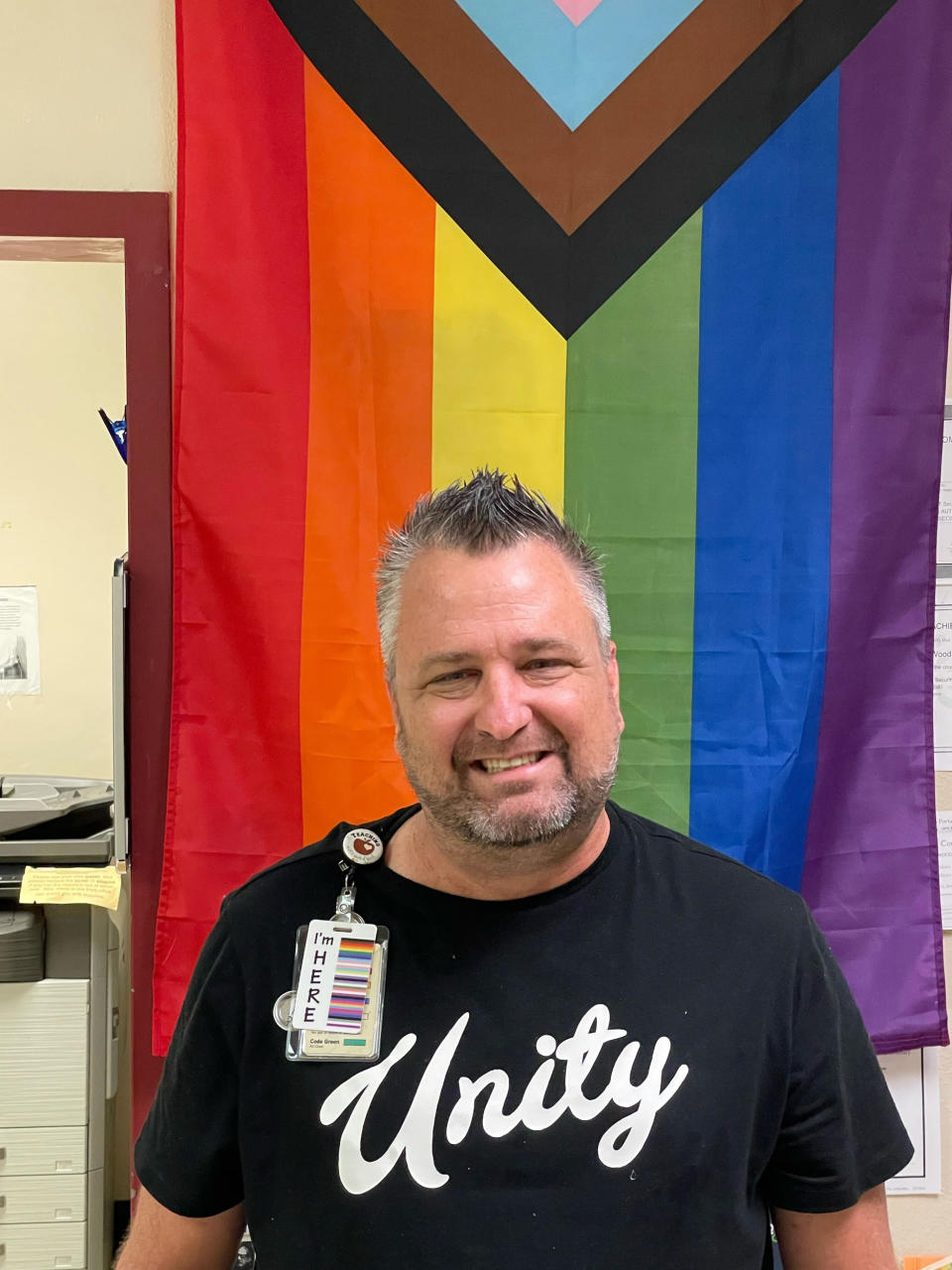'I cannot teach in Florida': LGBTQ educators fear fallout from new education law
Last month, a group of parents in Orlando, Florida, demanded “consequences” against sixth grade science teacher Robert Thollander. His crime? Thollander acknowledged his marriage at school.
“He married a man. This alone is not an issue. Sharing the details … with all his 6th grade students is the issue,” the parents wrote in a letter sent to their children’s school board, which was shared with NBC News. “It was not appropriate. Many of these students felt very uncomfortable with the conversations and shared this with their families.”
Had Thollander just “said he will be out for a few days because he was getting married, no problem,” the letter continued, “but to discuss the details and create an uncomfortable situation for the students with no benefit to teaching his subject matter is inappropriate.”

Thollander denied having discussed his marriage since he and his husband tied the knot in March of last year, aside from acknowledging it when he was asked. No action was taken against him by school leaders, who defended him several days later with a letter of their own, he said.
Nevertheless, the incident prompted Thollander to make this school year his last after 11 years of working in Florida as a teacher.
“A lot of trust is given to teachers, and it made it seem like I wasn’t trusted because there’s something wrong with me for being gay,” he said. “It makes it seem like being gay is something vile or disturbing or disgusting when it’s described as making children uncomfortable knowing that I’m married to a man. It hurt.”
While the Orlando parents did not succeed in having Thollander disciplined or ousted, he and other LGBTQ teachers in the state worry that newly signed state law — titled Parental Rights in Education but dubbed by critics as the “Don’t Say Gay” law — will galvanize parents to take similar action against them. In fact, Thollander said he believes the parents who complained about him were emboldened by the bill even before it was signed into law.
With the new law in place, teachers fear that in talking about their families or LGBTQ issues more broadly, pointed letters will be the least of their worries.
The law, HB 1557, bans “instruction” about sexual orientation or gender identity “in kindergarten through grade 3 or in a manner that is not age appropriate or developmentally appropriate for students in accordance with state standards.” Florida Gov. Ron DeSantis signed it into law Monday. Parents will be able to sue school districts for alleged violations, damages or attorney’s fees when the law goes into effect July 1.
Lawmakers who support the law have repeatedly stressed that it would not prohibit teachers and students from talking about their LGBTQ families or bar classroom discussions about LGBTQ history, including events like the 2016 attack at the Pulse nightclub, a gay club in Orlando. Instead, they argue, it is about giving parents more jurisdiction over their children’s education.
But legal experts have said the broad language of the law could open districts and teachers to lawsuits from parents who believe any conversation about LGBTQ people or issues is “inappropriate.”

Nicolette Solomon, 28, taught fourth grade in Miami-Dade County for more than four years. As HB 1557 passed through the Legislature, she quit. Solomon, a lesbian, said that after months of having taught virtually through the coronavirus pandemic, the law was “the straw that broke the camel’s back.”
“The law would erase me as an LGBTQ teacher,” she said. “Nobody would be able to know, which then puts me in the closet, and I’m there seven hours a day, if not more, five days a week. I wouldn’t be able to be who I am.”
“And I don’t think I can bear to see the students struggle and want to ask me about these things and then have to deny them that knowledge,” she added. “That’s not who I am as a teacher.”
Some Florida teachers also worry that the law will worsen the disproportionate rates of bullying, harassment and mental health issues plaguing their LGBTQ students.
A survey last year by The Trevor Project, an LGBTQ youth suicide prevention and crisis intervention organization, found that 42 percent of the nearly 35,000 LGBTQ youths who were surveyed seriously considered suicide within the previous year. More than half of transgender and nonbinary youths who were surveyed seriously considered suicide, it also found.
“Will other students interpret that as ‘Hey, now I have a pass to bully or mistreat certain students?’” asked Brian Kerekes, who teaches math at a high school in Osceola County, referring to the law. “It’s not out of the realm of imagination that that could now be an issue.”
A separate survey conducted by The Trevor Project last year found that LGBTQ youths who reported having at least one LGBTQ-affirming space reported lower rates of attempting suicide.
With that in mind, he said, Kerekes asks his students for their preferred pronouns at the beginning of every school year. He also places other LGBTQ-affirming symbols in his classroom, including a rainbow Pride flag and a sign that says “safe space.”
“Our students need to see that the educators in their community are as diverse as the rest of that community. They need educators that look and resemble them,” said Kerekes, who is gay. “We want them to know that we see them and respect them so that they can focus on what it is that they’re learning in class and not have to worry about how they’re going to be treated because of who they are.”
Building successful teacher-to-student relationships has become increasingly important in recent years, Kerekes said, in light of remote learning during coronavirus lockdowns and the rise in school shootings nationally.
With the passage of the new Florida law, Kerekes worries that most teachers will now “hesitate to be the advocates and the mentors” for LGBTQ kids who may confide in them.
Supporters of the measure say exposing kids to LGBTQ symbols and identities is part of the problem.
DeSantis, who is widely seen as considering a run for the 2024 GOP presidential nomination, said Monday that the law will ensure “that parents can send their kids to school to get an education, not an indoctrination.”

Tiffany Justice, who served on a Florida school board for four years and co-founded a national network of about 80,000 parents, Moms for Liberty, agreed, saying the law is needed to fight a “transgender contagion” sweeping the country.
“This is parents pushing back,” Justice, a mom of four school-aged children, said. “They’ve had enough. We’ve seen enough nonsense. The kids are not learning to read in schools, and what I have said before is ‘Before you activate our children into social justice warriors, could you just teach them how to read?’”
She added, “Teachers really need to get back and focus on what they’re supposed to be teaching in schools.”
Michael Woods, a special education teacher in Palm Beach County, said legislators and parents are looking for a “solution to a problem that doesn’t exist.”
“Teachers do not go out of their way to create these moments where we’re ‘indoctrinating’ students,” said Woods, who is gay. “If I could indoctrinate a student, it would be to bring a pencil and a piece of paper, and if I was really good at ‘indoctrinating,’ I would be able to get them to do their homework.”
Some educators are also concerned about a section in the law that will require them to notify parents of a child’s “mental, emotional, or physical health or well-being ... unless a reasonably prudent person would believe that such disclosure would result in abuse, abandonment, or neglect.”

Critics have said the provision will force teachers to “out” their LGBTQ students to their parents, potentially leaving them vulnerable to rejection at home.
From her first week on the job, Solomon said, “so many kids” throughout her elementary school — even those she did not teach directly — came out to her.
“They want to go to someone like a teacher who they might not know for the rest of their lives or someone who they know won’t judge them or won’t tell anybody,” she said. “They’re kids. They can’t just call a therapist and make an appointment.
“I don’t want to be in that situation where, instead of helping the students, I’m going to be hurting them,” she added.
On Monday, the American Federation of Teachers, the country’s second largest teachers labor union, slammed the measure, calling it an “assault” on students and teachers.
“Make no mistake, this bill will have devastating real-world consequences—especially for LGBTQIA+ youth who already experience higher rates of bullying and suicide,” Randi Weingarten, the group’s president, said in a statement. “And for teachers and school staff who work tirelessly to support and care for their students, this bill is just another gross political attack on their professionalism.”
U.S. Education Secretary Miguel Cardona met in private with LGBTQ students and their family members Thursday to discuss the impacts of the law.
Earlier in the week, Cardona issued a statement saying the Education Department would “monitor” the law upon its implementation and “evaluate whether it violates federal civil rights law.”
In the meantime, Thollander will be putting his new real estate license to work, and Solomon will be working on her newly launched LGBTQ family-focused podcast, “Flying the Coop.”
“I would teach in another state, but I cannot teach in Florida,” Solomon said. “It’s just so horrible.”
Beyond Florida, legislators in several other states — including Georgia, Tennessee, Kansas and Indiana — are weighing measures similar to the Florida law, which Justice said was “just the beginning.”
“We’re not stopping here,” Justice said. “If they think they have a problem with HB 1557 in Florida, wait until it’s in all 50 states. And we won’t stop until it is.”

